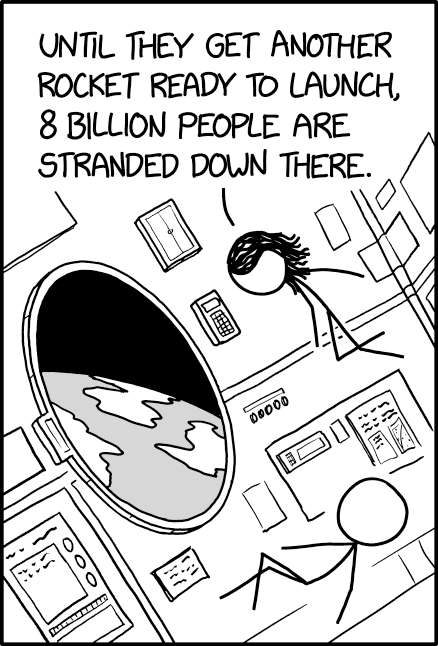Reminds me of the old Niven stories about asteroid belt-miners, who disdainfully referred to being on the surface of a planet as being at “the bottom of a hole.”
I’m a space nut, and people often ask me about colonizing Mars. And I always think, sure I guess you could, but why? Once you’ve made it to orbit, make the most of it, why put yourself down at the bottom of a gravity well? Just colonize orbit, asteroids, or small moons. That’s where the resources are, and that’s where it’s easy to move them.
Humans are very picky. Must have certain amount of gravity, need to see green stuff, can’t handle radiation etc. it’s is as if they were built to be on a specific planet and nowhere else.
You’re totally right, but that gravity, that green stuff, neither of those are on Mars. In orbit at least you get the gravity, rotating habitats aren’t that much more complicated than static ones.
I’m not sure if Mars’ poison and irradiated soil will ever be useful for growing plants. I’m telling you while it is a similarly sized planet, it’s still barely useful.
The presence of water is nice
That’s true. Local water, even as trace ice crystals, would be easier to harvest than chipping apart a comet in deep zero g. But ultimately, your materials for both construction and life support are going to have to start coming from space, and asteroids and comets are the obvious choice.
The best strategy would probably be to send a relatively small vehicle to the comet (small relative to the comet), something like the power and propulsion core for the new lunar gateway, essentially just a big ion thruster with a bunch of solar panels. This can push the comet into an orbit that swings it by the moon to capture it into an earth orbit. You may need to do some earth flybys to lower the comet’s orbit first, so the mission could take years. But to make up for that, comets are huge, and after it’s done you have a source of many different materials to work with right here in earth orbit, enough material to last decades or more.
But not all water is useful.
We have a lot of non useful water on Earth in the oceans that has too much salt.
Water from non-Earth sources might contain dissolved minerals at poisonous levels for agriculture, much less human consumption.
And if there’s liquid water from a non-Earth setting, there might be some kind of unknown exo-organisms living in it.
Water from non-Earth sources might contain dissolved minerals at poisonous levels for agriculture, much less human consumption.
Oh yeah, it’s practically guaranteed to contain nasty stuff! We’re gonna drink it anyway though.
Most of that water on earth that we’d consider “not useful” would fall into the “100% useful” category if found in space. As long as the contaminants have a different boiling temperature from water, you can always boil the water into steam in order to separate it. Or you could also use electrolysis to separate out the hydrogen and oxygen and then recombine then in clean tanks.
These are expensive methods of purification, energy intensive, but solar panels really well with no atmosphere and 24/7 sun exposure, so this is all feasible.
I think we could send robot farmers there to grow some food for the people living in orbit. Maybe low-G carrots could be nicer than the ones grown on earth.
Entirely possible. But hey, in a space station you could have a separate agriculture ring, it may turn out that plants grow most efficiently at some particular amount of gravity, having its own ring would let you experiment, to maximize yield. Also you can use shades and mirrors to precisely control the amount of sun the plants get, even provide them constant sun if that speeds up growth.
Given the means to process, refine and build in zero g, I’d love to have my own asteroid.
Rorschach: lifts mask, scratches ear
I dunno. I heard they only brought one set of clothes, and they have to wear those clothes until February without being able to wash them.
Doesn’t sound pleasant.
The fact that the initial mission duration was 8 days makes it unlikely this is true, and with multiple cargo missions since then (for example two already this August), it is even more unlikely they wouldn’t have received a new set of clothes by now.
Spaceships stink. Common trope in sci-fi.
Wonder how much willpower they have




